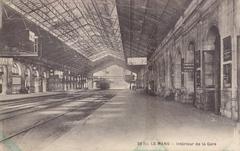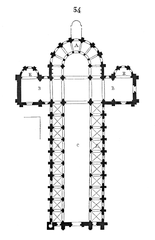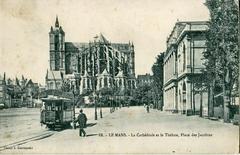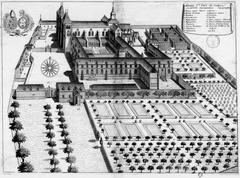Departmental Archives of Sarthe Le Mans: Comprehensive Visitor Guide, Hours, Tickets, and Historical Insights
Date: 14/06/2025
Introduction
Situated in the historic city of Le Mans, the Departmental Archives of Sarthe serve as a vital guardian of over a millennium of regional documentary heritage. Established during the sweeping reforms of the French Revolution, this institution was created to centralize, protect, and provide access to a vast array of historical records, ranging from medieval parish registers and notarial deeds to modern civil status documents. Today, the archives not only safeguard essential records reflecting Sarthe’s social, political, and cultural evolution but also stand as a hub for genealogists, historians, students, and cultural enthusiasts seeking to explore the region’s past.
Housed in a purpose-built, modern facility at 9 rue Christian Pineau, Le Mans, the Departmental Archives of Sarthe have embraced digitization, offering online access to a significant portion of their collections. Visitors and researchers can explore centuries-old parish registers, cadastral maps, military conscription records, and private family papers. The archives also provide a range of services, including reading rooms, expert staff assistance, guided tours, educational workshops, and full accessibility accommodations.
Whether you are tracing your ancestry, conducting academic research, or simply passionate about Sarthe’s heritage, this guide will equip you with essential information on the archives’ history, collections, visiting hours, admission policies, and tips to maximize your research experience (archives.sarthe.fr, FranceArchives, Wikipedia).
Table of Contents
- Origins and Establishment
- Evolution of the Archives
- Collections and Holdings
- Visitor Information
- Research and Educational Activities
- Genealogical and Historical Research
- Online Resources
- Accessibility and Facilities
- FAQ
- Nearby Le Mans Historical Sites
- Contact Information
- References
Origins and Establishment
The Departmental Archives of Sarthe were founded in the aftermath of the French Revolution, part of a nationwide effort to reorganize and safeguard the documentary evidence of the newly established departments. The Law of 5 Brumaire, Year V (26 October 1796) mandated the creation of departmental archives to centralize documents produced by the new administrative bodies, as well as those inherited from the Ancien Régime (FamilySearch; archives.sarthe.fr).
Initially, the archives were housed in various locations around Le Mans, reflecting the evolving needs of the region as collections grew and preservation standards advanced (Wikipedia).
Evolution of the Archives
19th Century: Institutionalization and Growth
Throughout the 19th century, the archives underwent significant expansion and professionalization. The first archivists were appointed, and the holdings grew to include not only administrative records but also judicial, fiscal, and ecclesiastical documents dating back to the Middle Ages. Key works, such as Julien Pesche’s “Dictionnaire topographique, historique et statistique de la Sarthe” (1829), highlighted the archives as an essential resource for historians and genealogists (Lexilogos).
20th–21st Centuries: Modernization and Digitization
The 20th century brought advancements in cataloging and conservation. The two World Wars underscored the importance of safeguarding heritage, and in 2002, the archives moved into a new, state-of-the-art building at 9 rue Christian Pineau. This facility provides 53,000 linear meters of storage, climate-controlled repositories, and spaces for research and exhibitions (Wikipedia; archives.sarthe.fr).
In the 21st century, digitization has become central, with extensive online collections supporting global access and democratizing archival research (archives.sarthe.fr).
Collections and Holdings
The archives preserve a remarkable array of documents:
- Ancien Régime records: Judicial, fiscal, and ecclesiastical documents from the Middle Ages to 1790, including parish registers.
- Civil status and revolutionary records: Births, marriages, and deaths from 1792 onward, census records, and military conscription lists.
- Notarial archives: Wills, contracts, and other legal documents, vital for genealogical research.
- Maps and plans: Cadastral surveys, Napoleonic land registers, and historical maps such as the Cassini collection (Lexilogos).
- Private and special collections: Family papers, business archives, and personal correspondence, as well as photographs, posters, and engravings.
Among the most notable holdings are medieval charters, documents from the Plantagenet era, and rare 17th–18th century maps (Lexilogos).
Visitor Information
Location and Access
- Address: 9 rue Christian Pineau, 72100 Le Mans, France
- Public transport: Accessible via Le Mans TGV station and local bus lines. Parking is available nearby.
Visiting Hours
- Standard hours: Monday to Friday, 9:00 AM – 5:00 PM
- Closed: Weekends and public holidays
- Note: Always check the official website for updates, especially during holidays or special events.
Admission and Registration
- Admission: Free of charge
- Registration: Present a valid photo ID to receive a free reader’s card, required for the reading room
- Personal belongings: Must be stored in lockers; only pencils, laptops, and notepads permitted in research areas
Research and Educational Activities
Reading Rooms
Spacious, well-lit reading rooms with individual desks, power outlets, and Wi-Fi are available. Staff archivists assist with document requests, research guidance, and technical support.
Digital Resources
A substantial part of the collection is digitized and accessible via in-house terminals and an online portal. Visitors should consult the online catalog before their visit to reserve materials or plan research.
Reproduction and Photography
Self-service photography (without flash or tripods) is allowed for research purposes. High-quality reproductions for publication require a request and may incur a fee.
Workshops, Tours, and Events
The archives offer workshops, exhibitions, and guided tours for schools, universities, and the general public. Event details are available on the archives’ agenda page.
Genealogical and Historical Research
Key Record Types
- Parish registers and civil status records: Covering births, marriages, and deaths from the 16th century onward. Duplicate registers from 1736 and systematic civil registration from 1792 (FranceArchives).
- Notarial records: Wills, contracts, and property deeds.
- Census, military, and administrative records: Offer context on individuals’ occupations and social status.
Research Tips
- Identify the commune: Records are organized by commune, and knowledge of historic and current names is essential.
- Understand terminology: Be aware of the French Republican calendar and archival terminology for revolutionary-era documents.
- Prepare in advance: Use the online catalog and bring necessary documentation.
- Seek staff assistance: Archivists can help with paleography and locating complex records.
- Privacy rules: Records older than 100 years are open; more recent records require requests at local town halls.
Online Resources
- Parish and civil status registers
- Digital collections and research guides
- Municipal Archives of Le Mans
- Guide to Sarthe communes and administrative changes
Accessibility and Facilities
The archives are fully wheelchair accessible, with ramps, elevators, adapted restrooms, and staff trained to assist visitors with disabilities. Assistance dogs are welcome.
On-site amenities include secure lockers, restrooms, vending machines, and free Wi-Fi. There is no cafeteria, but cafés and restaurants are within walking distance.
FAQ
Do I need a ticket to enter?
No, entry is free; registration with a valid photo ID is required.
Are the archives accessible?
Yes, the facility is fully accessible.
Can I take photographs?
Yes, for personal use and without flash; some restrictions apply.
Are guided tours available?
Yes, check the events page or contact the archives.
Can I access documents online?
Many records over 100 years old are digitized and accessible via the online portal.
Nearby Le Mans Historical Sites
After your visit, consider exploring:
- Le Mans Cathedral
- The medieval Cité Plantagenêt and Roman Walls
- 24 Hours of Le Mans Museum and Circuit
- Musée de Tessé
Contact Information
-
Departmental Archives of Sarthe
- Address: 9 rue Christian Pineau, 72100 Le Mans, France
- Phone: +33 (0)2 43 54 74 74
- Email: [email protected]
- Website: https://archives.sarthe.fr/
-
Municipal Archives of Le Mans
- Address: 102 rue Gambetta, 72000 Le Mans, France
- Phone: +33 2 43 47 49 03
- Email: [email protected]
References
- Discover the Departmental Archives of Sarthe: A Must-Visit Historical Site in Le Mans
- Departmental Archives of Sarthe - Wikipedia, 2024
- Visiting the Departmental Archives of Sarthe, FranceArchives, 2024
- FamilySearch - Sarthe, France Genealogy
- Lexilogos - Sarthe
- Le Mans Tourism Official Site
- Departmental Archives of Sarthe Official Website
Plan your visit to the Departmental Archives of Sarthe today to unlock the region’s rich history and make the most of your cultural journey in Le Mans and beyond!






